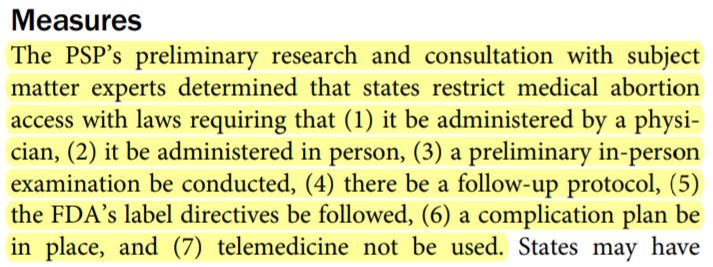Study: Emergency room staff frequently miscode medication abortion visits as miscarriage visits
Note: In this article the terms “chemical abortion” and “medication abortion” are interchangeable.

This month (November 2021), Health Services Research & Managerial Epidemiology published “A Longitudinal Cohort Study of Emergency Room Utilization Following Mifepristone Chemical and Surgical Abortions, 1999–2015.” The study’s researchers reviewed records of 423,000 abortions, noting whether they were chemical or surgical abortions. They then reviewed the records of 121,283 emergency room (ER) visits within 30 days of the abortions by the people who had obtained those abortions, noting whether the ER visits were coded as related to induced abortion, spontaneous abortion (i.e. miscarriage), or some other cause (not abortion-related). They analyzed the subsequent data and found:
- Compared to surgical abortions, chemical abortions involved 53% greater risk of going to the ER for an abortion-related reason.
- From 2002 to 2015, the rate of abortion-related ER visits following surgical abortion increased 315%; the rate increased 507% following chemical abortion.
- Compared to women who had surgical abortions, women who had chemical abortions and were twice as likely to go to the ER following a subsequent abortion.
- In 2015, of the abortion-related ER visits following chemical abortion, over 60% were miscoded as ER visits for miscarriage.
Note that if the ER visit was within 30 days of the medication abortion, that isn’t enough time to complete the abortion, get pregnant again, and have a miscarriage. Instead, it appears ER staff are miscoding medication abortion-related visits as miscarriage-related visits a majority of the time.
This misinformation is particularly important because abortion proponents insist medication abortion is extremely safe, and their questionable claims of safety are often their basis for calling for major deregulation of abortion-inducing drugs. For example, according to a 2021 study, abortion activists consider medication abortion laws to be “abortion restrictions” if they require providers to:
- be physicians
- provide abortion pills to patients in person
- conduct preliminary in-person exams
- have follow up protocols in place
- have plans for any complications, or
- follow FDA label directives

Some abortion activists have started calling for abortion pills to be made available by “advanced provision,” meaning physicians would prescribe these drugs to patients who aren’t currently pregnant. Patients keep the pills on hand at home in case they get pregnant later. Abortion activists are notably silent on what safety protocols would be in place to prevent (1) patients from giving the pills to other people who haven’t been vetted by a doctor or (2) other people obtaining these pills and slipping them to unknowing and unwilling girlfriends, wives, or daughters. It would be difficult in such an event for a woman to realize she was not enduring a miscarriage, but had been clandestinely drugged.
If lack of safety weren’t concern enough, abortion activists are also promoting lack of knowledge. There is increasing research exploring “missed period pills,” which are abortion-inducing drugs women can take when they believe they may be pregnant but haven’t yet confirmed pregnancy. Researchers tout “psychological and emotional benefits, including management of abortion stigma” as upsides to “missed period pills,” since a woman could take them and not truly know whether she had an abortion or just a heavy period. The ignorance is the point. As explained in the New York Times:
Some women would be inclined to use the abortion medications without first confirming that they were pregnant. Doing so, many said, would allow them to avoid the burden of that knowledge and the pain of self-flagellation, providing them with a psychological benefit at a time of great stress.
Patrick Adams, “Why Some Women Might Want ‘Missed-Period Pills,'” New York Times, December 2020
[Read more from Equal Rights Institute: “Missed Period Pills”: An Ethical Nightmare]
With their unchecked embrace of abortion pills, it’s not surprising abortion activists have started counseling women who have complications from medication abortion to tell emergency room staff that they are having a miscarriage, and to hide the fact that they’ve ingested abortion-inducing drugs. But this means abortion proponents want to have it both ways: they tell the rest of the world abortion pills are extremely safe while telling women experiencing dangerous complications from the pills to lie about it.








Aha, thanks.
This is by design, not by accident. Abortion advocates need a corpse to dance on if they’re to defeat the pro-life movement. If Savita Halappanavar were still alive, abortion would still be illegal in Ireland and its pro-choice movement would just be a handful of trolls at broadsheet.ie. Likewise, they need a woman to die of an illegal abortion in order to expand abortion on demand. But they know that while very few women are stupid or desperate enough to resort to coat hangers or knitting needles (the Hyde Amendment and experience of pro-life states attests to this), some might trust a doctor to sell them pills over the internet.